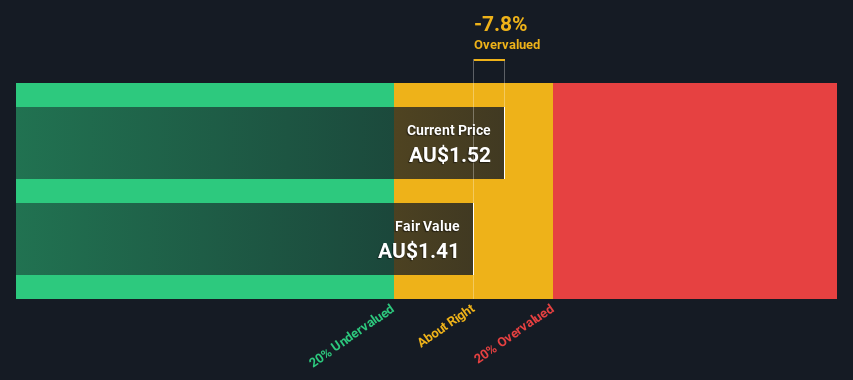A look at the intrinsic value of Beach Energy Limited (ASX:BPT)

Key findings
-
The forecast fair value for Beach Energy is AU$1.41 based on the dividend discount model.
-
With a share price of AU$1.52, Beach Energy appears to be trading close to its estimated fair value
-
Our fair value estimate is 21% below Beach Energy’s analyst price target of AU$1.78.
Today we’ll run through a simple valuation technique to help us assess the attractiveness of Beach Energy Limited (ASX:BPT) as an investment opportunity. We do this by taking the company’s forecast future cash flows and discounting them to today’s value. The Discounted Cash Flow (DCF) model is the tool we use to do this. Don’t be put off by the technical jargon, the math behind it is actually quite simple.
Companies can be valued in many ways, so we would like to point out that a DCF is not perfect for every situation. If you still have questions about this type of valuation, take a look at Simply Wall St’s analysis model.
Check out our latest analysis for Beach Energy
What is the estimated value?
Because Beach Energy operates in the oil and gas sector, we need to calculate intrinsic value a little differently. This approach uses dividends per share (DPS) because free cash flow is difficult to estimate and often not reported by analysts. This often underestimates a stock’s value, but it can still be a good comparison to competitors. We use the Gordon Growth Model, which assumes the dividend grows at a sustainable rate over time. The dividend is expected to grow at an annual growth rate that matches the 5-year average 10-year Treasury yield of 2.3%. We then discount this figure to today’s value at a cost of equity of 8.4%. Relative to the current share price of AU$1.5, the company seems about fair at the time of writing. However, remember this is only an approximate valuation and as with any complex formula, where there’s garbage in, there’s garbage out.
Value per share = Expected dividend per share / (Discount rate – Perpetual growth rate)
= 0.09AU$ / (8.4% – 2.3%)
= 1.4AU$


The assumptions
The key inputs to a discounted cash flow are the discount rate and, of course, the actual cash flows. Part of investing is making your own assessment of a company’s future performance, so try the calculation yourself and check your own assumptions. DCF also does not take into account the potential cyclicality of an industry or a company’s future capital needs, and therefore does not provide a complete picture of a company’s potential performance. Since we are viewing Beach Energy as prospective shareholders, the cost of equity is used as the discount rate, rather than the cost of capital (or weighted average cost of capital, WACC), which takes debt into account. In this calculation, we used 8.4%, which is based on a levered beta of 1.336. Beta is a measure of a stock’s volatility relative to the market as a whole. We get our beta from the industry average beta of globally comparable companies, with a set limit between 0.8 and 2.0, which is a reasonable range for a stable company.
SWOT Analysis for Beach Energy
Strength
weakness
Opportunity
Danger
Next Steps:
While a company’s valuation is important, it is only one of many factors you need to evaluate a company. It is not possible to get a foolproof valuation using a DCF model. It should be viewed more as a guide to “what assumptions need to be true for this stock to be under/overvalued.” For example, slightly adjusting the terminal value growth rate can dramatically change the overall result. For Beach Energy, we have compiled three additional points to consider:
-
Financial health: Does BPT have a healthy balance sheet? Take a look at our free balance sheet analysis with six simple checks on key factors such as leverage and risk.
-
Future income: How does BPT’s growth rate compare to its competitors and the overall market? Learn more about analyst consensus numbers for the coming years by using our free chart of analyst growth expectations.
-
Other solid companies: Low debt, high returns on equity, and good past performance are the foundation of a strong company. Check out our interactive list of stocks with solid business fundamentals to see if there are any other companies you may not have considered!
PS The Simply Wall St app runs a discounted cash flow valuation for every stock on the ASX every day. If you want to find the calculation for other stocks, just search here.
Do you have feedback on this article? Are you concerned about the content? Get in touch directly from us. Alternatively, send an email to editorial-team (at) simplywallst.com.
This Simply Wall St article is of a general nature. We comment solely on the basis of historical data and analyst forecasts, using an unbiased methodology. Our articles do not constitute financial advice. It is not a recommendation to buy or sell any stock and does not take into account your objectives or financial situation. Our goal is to provide you with long-term analysis based on fundamental data. Note that our analysis may not take into account the latest price-sensitive company announcements or qualitative materials. Simply Wall St does not hold any of the stocks mentioned.
Do you have feedback on this article? Are you interested in the content? Contact us directly. Alternatively, send an email to [email protected]



